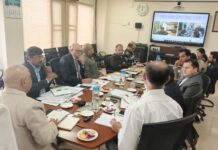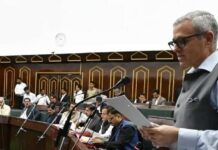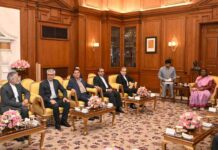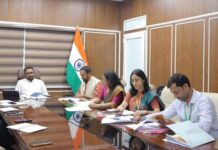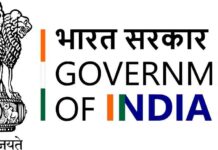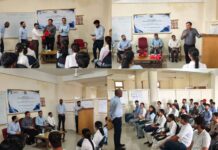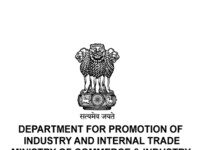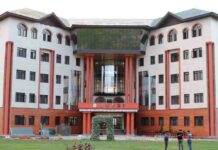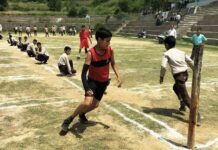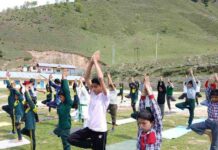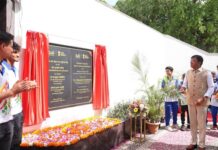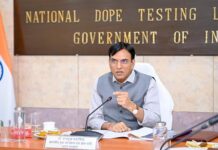JAMMU, DECEMBER 17: The J&K Advisory Board for Development of Kisans today convened board meeting under the chairmanship of it’s Vice Chairman and Additional Chief Secretary (ACS), Agriculture Production Department, Atal Dulloo.
Professor J P Sharma, Vice Chancellor SKUAST, Jammu was also present in the meeting.
The meeting had detailed discussion on present status of Irrigation network in Jammu Division besides chalking out a workable solution for complete de-slitting and renovation of irrigation canals, minors and tributaries so that farmers whose land is on the tail end of these canals can get water throughout crop season. Further, a proper calendar for the opening and closing of these canals was discussed based on the actual requirement of water as per available cultivable area, after taking into consideration the present environmental changes viz-a-viz global warming.
The meeting was attended by Board members, head of departments of Agriculture, Chief Engineer Irrigation and Flood Control, Jammu, Chief Engineer Ravi Tawi Irrigation Jammu, Director Rural Development Jammu, CEO JKEDA, Director Metrological Department Jammu, Regional Director Central Ground Water Jammu and Chief Engineer PDCL, Jammu.
While addressing the meeting, ACS said that the concerns raised by Board members needs to be addressed jointly and the irrigation problem in Jammu division needs to be tackled seriously. He endorsed the suggestions put forth by VC SKUAST-Jammu and the Board members. He advised that SKUAST-Jammu and SKUAST-Kashmir should immediately start two Incubation Centres where training to farmers can be given on usage of water in their crops, management of irrigation resources, proper and judicious use of fertilizers in their fields.
Atal Dulloo asked the Irrigation and Flood Control Department Jammu to schedule a workable calendar in consultation with Director Agriculture Department Jammu for opening and closure of these canals so that farmers concerns are addressed.
ACS said that the defunct khulls, dug wells and tube wells should be immediately made operational and proper funds be projected in this regard. He further advised that the siphons constructed on irrigation canals which have either damaged or blocked should be immediately repaired.
Atal Dulloo asked the Chief Engineer Irrigation and Flood Control Department Jammu to keep sufficient submersible pumps and Electric motors / diesel generators available as stand by units in these water scarcity areas so that water should remain available to the farmers round the clock.
Regarding availability of Electric supply to motors installed in farmer’s fields, he asked the Chief Engineer PDCL Jammu to schedule the curtailment programme as per the requirement and need of farmer.
Taking a serious note of non allotment of solar pumps to the farmers who have deposited their marginal money under PM-KUSUM scheme with the J&K Energy Development Agency, Atal Dulloo directed CEO JKEDA to immediately initiate action against the company / firm who has failed to deliver solar pumps to the farmers. He further asked for covering maximum farmers under PM-KUSUM Scheme.
ACS asked the Secretary J&K Advisory Board for Development of Kisans to raise awareness among masses to avoid dumping of domestic wastes in to these canals. He asked the Board to conduct these programms in coordination with RDD Jammu besides Jammu Municipality corporation and schools.
Professor J.P. Sharma, VC SKUAST-Jammu in his address, appreciated the efforts of Board for arranging and convening such type of important meetings which are farmer centric. He said we need to find long term measures to address the issues of farmers living in Border areas, and a comprehensive plan needs to be worked out to keep these canals clean and free from pollution.
He said that awareness camps needs to be organized among the farmers and all citizens to keep these canals clean and avoid dumping of domestic wastes into them, besides awareness on water usage and water management programmes should be held. On crop diversification, he said that we need to promote only those crops in water scarcity areas which require less water for irrigation.
Vice Chancellor SKUAST- Jammu advised that the Board members of J&K Advisory Board for Development of Kisans be deputed for training programmes conducted by ICAR Dehradoon on water management and water usage, who can then train other fellow farmers. He further said that we should promote Bio gas plants in rural areas and the Animal Husbandry department Jammu can rope in maximum farmers under GOKUL mission.
Director Rural Development, Jammu, informed that the work of Minors, tributaries and local Khulas are being taken up for repairs under MG NEGRA scheme and awareness camps are arranged for keeping these canals, Minors, tributaries and local khulas free from pollution.
Director Agriculture and Farmers welfare Department Jammu in his Power Point Presentation presented the total irrigation demand as per the net cultivable area available in Jammu division. He presented the crop wise requirement of water and gave a detailed synopsis of Agriculture profile of Jammu Division.
Chief Engineer irrigation and Flood Control gave the PPP, highlighting the quantum of water which the department makes available to the farmers fields during crop season.
Regional Director Central ground Water Board gave the PPT on piezometers/testing wells indicating the ground water aquifers, ground water level and potential of ground water in Jammu Division. He informed that the Jammu Division has good reserves of ground water which gets replenished through Annual rain fall and ground water can be viable source of irrigation to the farmers.
The Board members present in the meeting gave various suggestions for revival of the past glory of Ranbir Canal, Partap canal and Kathua canal. They said that some expert agencies like IIT Roorkee should be engaged by J&K Irrigation and flood control department for one time solution regarding revival of these canals.
Earlier, Secretary of the Board, Abdul Hamid Wani apprised the Participants about the importance of the meeting. He said that water is a critical input for Agricultural production and plays an important role in food security, where irrigation is the process through which controlled amount of water can be supplied through artificial means to farmers fields and irrigation management is important.




